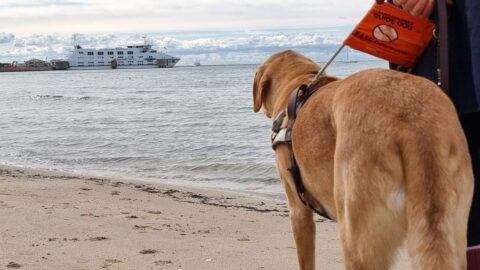Tourism Sector
Respecting the Handler
Time to read: Approximately 2 minutes
Treating Handlers with dignity and respect is key to ensuring positive experiences. Always show the same level of respect to a Handler that you would to any other person. Here is a list of things to keep in mind when interacting with a Handler.

Ways to show respect to a Handler include:
- Recognising that a Handler’s capacity to understand what is being said to them is not necessarily diminished because of their disability.
- Making sure not to raise your voice unnecessarily in hope that the Handler may understand you better.
- Addressing any questions directly to the Handler, rather than to other members of their group.
- Focusing your attention on the Handler rather than their Assistance Dog.
- Making sure not to refer to an Assistance Dog as a ‘pet.’ This undermines the importance of their role as a highly trained and skilled Assistance Dog.
- Refraining from asking questions about a Handler’s disability. This is inappropriate and upsetting.
- Asking the Handler whether they would like assistance, rather than assuming that it is needed. Always ask first as it can be quite alarming for the Handler if someone grabs their arm or pushes their wheelchair without permission.
- Asking the Handler whether they would like a wheelchair. Do not assume one is needed just because the Handler has a disability.
- Putting in the effort to give specific verbal directions. Simply pointing ‘over there’ does not work for those who are visually impaired.
- Standing in front of the Handler and speaking clearly if the Handler is hearing impaired.
- Asking the Handler before taking a photo of an Assistance Dog.
It is important to be aware that:
- A significant proportion of disabilities are not visible and people who live with an invisible disability can still rely on an Assistance Dog. We need to treat them with the dignity they deserve.
- Some people like to keep their disability private. They deserve your respect.
- Assistance Dogs are not always required to be on a leash or harness to perform their specific role. Some Assistance Dogs are trained to enter unfamiliar spaces and check to see that no threats are there and come back and signal that it is safe for the Handler to enter. They will however always be under the control of the Handler.
- Not all Assistance Dogs wear harnesses, you may just see them in a coat.
- Not all Assistance Dogs are Labradors or Golden Retrievers like Guide/Seeing Eye Dogs. Eg Hearing Dog breeds are often Labradoodles, Beagles, Shih Tzus or other breeds. Do not assume.
These are the key areas that are important to a Handler on holidays:
